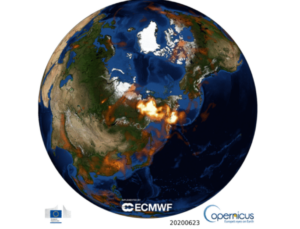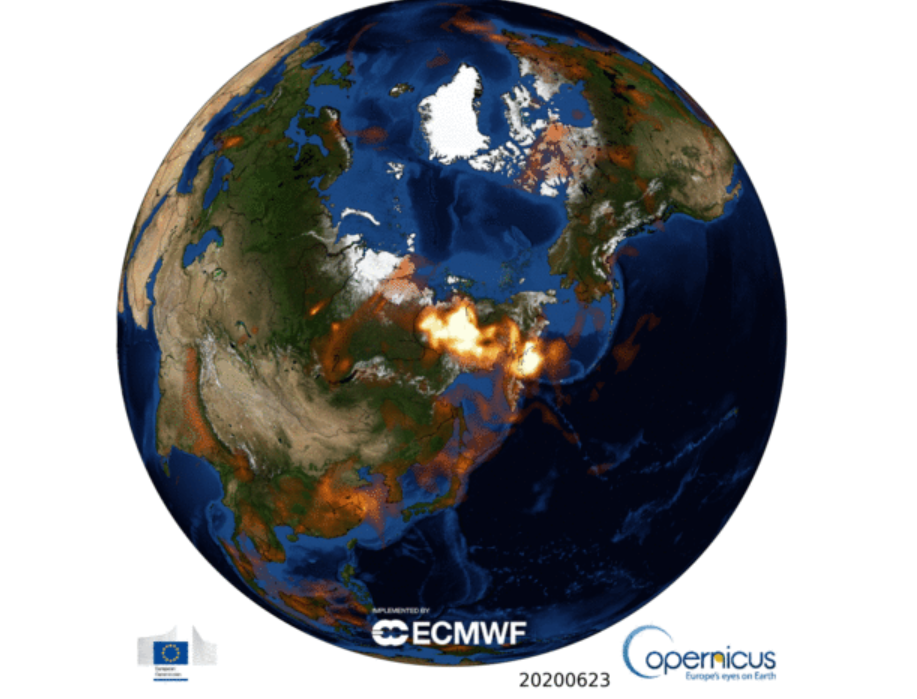
The Arctic is once again on fire. And the extremely warm temperatures in the region — and concurrent wildfires — are another urgent reminder that we need to divest from fossil fuels as soon as possible.
They are a pressing reminder that any post COVID-19 bailout should be focused on an immediate just recovery toward industry workers, renewables, and clean energy.
However, the opposite is happening. New research shows that the Trump administration is giving billions in bailouts to the fossil fuel industry.
The news from the Arctic is deeply worrying. On Tuesday, scientists at the European Copernicus Climate Change Service reported that the unusually warm spell in the Arctic, which has seen record temperatures, continues.
They reported that “global temperatures for June were on par with 2019’s record temperatures for the same month. But the most striking regional feature was exceptional warmth over Arctic Siberia, where average temperatures reached as high as 10°C above normal for June.”
They again reiterated that the Arctic “as a whole has been warming substantially faster than the rest of the world.” This heat has consequences, with fires burning across the region since last month.
“For the second year in a row, June saw widespread fires flaring up across the far northeast of Siberia and in the Arctic Circle,” said the scientists.
The fires are so bad they are beginning to make the news. Also this week, National Geographic reported that the “heat has fueled an enormous outbreak of wildfires, including fires on tundra underpinned by permafrost — normally frigid soil that is likely becoming even less frozen this year.”
The journal noted that the recent spread of fires, which is normally too wet, cold, or icy to burn, is “raising alarms for ecologists and climate scientists” who fear that the fires could disrupt “entire ecosystems,” and “exacerbate global warming by burning deep into the soil and releasing carbon that has accumulated as frozen organic matter over hundreds of years.”
The scientists are alarmed at how far north the fires are burning and the fact that they are burning on permafrost — frozen ground — which in turn releases more carbon and methane into the atmosphere.
They are also alarmed at the scale of the fires. According to Russia’s forest fire agency, an estimated 3.4 million acres are burning.
The Washington Post adds that, “the fires that have erupted in Siberia this summer have been massive, sending out plumes of smoke that have covered a swath of land spanning about 1,000 miles at times…Satellite observations of Arctic wildfires in June also showed that fires this year are emitting more greenhouse gases than the record Arctic fires in 2019.”
With the smoke comes pollution. In June, the fires released more polluting gases into the atmosphere than any other month in 18 years of data collection, according to scientists.
But alarming scientists the most is that everything is happening much faster and quicker than scientists had predicted. Jessica McCarty, a fire researcher at Miami University in Ohio, told National Geographic, “when I went into fire science as an undergraduate student, if someone had told me I’d be studying fire regimes in Greenland and the Arctic, I would have laughed at them.”
Walt Meier, a senior research scientist at the National Snow and Ice Data Center at the University of Colorado at Boulder, said to the Post, “We always expected the Arctic to change faster than the rest of the globe. But I don’t think anyone expected the changes to happen as fast as we are seeing them happen.”
His colleague, Merritt Turetsky, director of the Institute for Arctic and Alpine Research at the University of Colorado at Boulder, added, “when we develop a fever, it’s a sign. It’s a warning sign that something is wrong and we stop and we take note. Literally, the Arctic is on fire. It has a fever right now, and so it’s a good warning sign that we need to stop, take note and figure out what’s going on.”
The burning, melting, and warming Arctic is clearly a sign that something is wrong and we need to stop investing in fossil fuels now. It is a timely reminder that there should not be a big polluter bailout in any COVID-19 recovery plan. It is a reminder that we should be investing rapidly in renewables.
Unfortunately this is not the case. Yesterday, a joint investigation by Documented and the Guardian reported that “over 5,600 fossil fuel companies have taken at least USD 3 billion in COVID-19 aid from the United States government.”
The paper reported that “the businesses include oil and gas drillers and coal mine operators, as well as refiners, pipeline companies and firms that provide services to the industry.” Worryingly, the USD 3 billion figure is probably “far less than the companies actually received,” noted the Guardian.
The Trump Administration is bailing out polluters as the warning signs from the Arctic get worse. It is clear that nobody should be bailing out the polluters when their profits are evaporating, when they are laying off workers and their pipelines cannot get built. We should not be propping up a dying industry.
Jesse Coleman, a researcher for Documented, told the Guardian, “we should not be wasting taxpayer dollars on an industry that’s in a tailspin of its own making, especially when it seems intent on bringing the whole planet down with it.”


Andy Andy andy…… tut tut tut….. you have not done your homework
https://www.iceagenow.info/temperatures-were-warmer-than-today-for-most-of-the-past-10000-years/
I see Andy is being trolled by a climate science denier who cites nonsense from an abominable anti-scientific blog.
To Joe: tut tut tut. It was most certainly not warmer over most of the past 10,000 years than it is now. A major paper published last July in Nature not only categorically argued that today’s global surface temperatures are unprecedented over the past 2000 years, thus supporting Mann et al. (1998), but for much longer than that. The Arctic has not been ice-free at any time in the past 120,000 years and probably not in 12 million years. Iceagenow is a risible blog run by an amateur hack.
The internet is full of trolls contaminating blogs with piffle like yours. As a scientist (something you aren’t), I find it annoying to see the Dunning-Kruger brigade out in force.